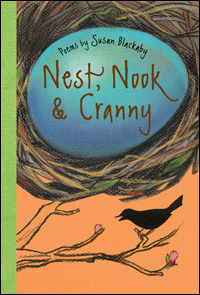Nest, Nook, and Cranny
Nest, Nook & Cranny
Poems by Susan Blackaby
Illustrated by Jamie Hogan
Charlesbridge, 2010
ISBN #978-1-58089-350-3
Nonfiction
Grades 3-6
"A doe will pick a thicket
As a place to place her fawn,
Its speckled hide well hidden
In the dappled forest lawn.
A bed safe in the shadows—
Mossy cushion, leafy crest—
A doe will pick a thicket
As a place to make a nest."
This stunning book of poems has it all. "Poetry, animal behavior, ecosystems, habitats, figurative language," says the Charlesbridge site. I agree.
Plus, I'd add mood and voice. And art.
I read Nest, Nook, & Cranny for the science. Open the book and look at the fabulous endpapers. I was hooked before I'd read a word.
But it's so much more than science. The book does an excellent job of fitting each animal within the context of its habitat while using evocative language in a variety of poetry styles. The language within each poem whisks the reader away to that habitat in the imagination.
The charcoal line drawings fit the mood perfectly and rendered the images in a realistic way that suited each poem and introduces each habitat across the spread with simple lines and shading.
Any teacher or librarian could enjoy reading this book to students, and it's a wonderful place to continue either science or poetry activities. Lessons stem naturally from the wealth of carefully researched science information and the back matter, which explains the poetry forms by poem. An introduction tells the reader about the author's inspiration for the book and she introduces her habitat in Beaverton, Oregon.
I loved this book and encourage it as a read-aloud. When time is short, as it often is during the school day, there's not a better way to combine two lovely subjects.
Activity 1
The author describes her habitat. Use figurative language to describe your own habitat.
Activity 2
Look up habitats. Choose a habitat that isn't used in the book. Write the characteristics of that habitat using interesting vocabulary. Include science words, too.
Challenge: Write about the habitat you chose in poetry form. Choose the style you want to use and fit your habitat information into it.
Interview of author and illustrator
See another review at Wrapped in Foil, March 29, 2010
National Science Standard: organisms and environments
Book provided by publisher








Shirley Smith Duke's Blog




